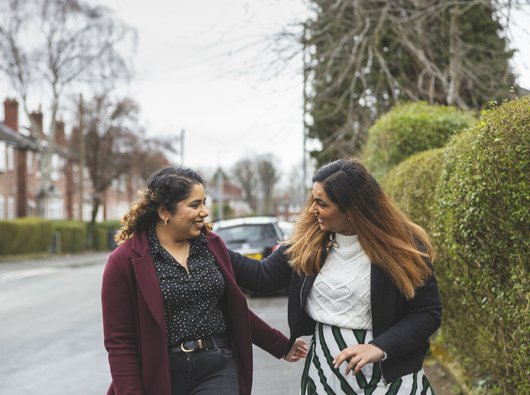Managing your child's leukaemia treatment
If your child is diagnosed with leukaemia, there will be a team of people at the hospital to support you both throughout the treatment and beyond.
Getting support
The hospital team will look after your wellbeing as a family as well as treating your child for leukaemia. Don’t be afraid to ask them questions and discuss any concerns you have.
Our Support Service is also on hand to offer practical and emotional support when you need it.
Your child’s hospital team
Your hospital should give you the names and contact details of their consultant, clinical nurse specialist (CNS) and other members of their team.
It's a good idea to write them down. You can then contact the team if you have any questions or concerns when you’re not at the hospital.
Most children and young adults with leukaemia, or blood cancer, are treated by a paediatric haematologist (a doctor who specialises in treating children with blood disorders) or a paediatric oncologist (a doctor who specialises in treating children with cancer).
All children with leukaemia will be given a key worker, usually a clinical nurse specialist (CNS). The CNS will care for your child as they go through their treatment. They’ll become important to you and your family and they’ll be a key link with the rest of your child’s healthcare team. You should have a meeting with the CNS when your child is first diagnosed.
When your child is diagnosed with leukaemia, their condition is discussed at a multidisciplinary team (MDT) meeting. An MDT brings together doctors, nurses and other specialist staff who’ll be involved in your child’s care. A senior consultant usually leads these meetings. The team will discuss the best treatment for your child and every aspect of their care.
Younger children may be upset about being in hospital, so an important way to help them cope is through guided play. Children’s wards employ play specialists to help younger children understand their treatment and how it might make them feel. They can also help your child to deal with any frustration or anger they may be feeling.
Teenage and young adults (TYA) cancer units will have activity coordinators to encourage young people to stay connected socially and have activities to engage them while they’re in hospital.
Play specialists and activity coordinators may also be able to work with brothers or sisters who may have some difficulty coping with their sibling’s cancer diagnosis, as well as the changes to family routine. Siblings may resent the extra attention given to the child who is ill, then feel guilty about those feelings. The hospital team can advise you how to work through this with them.
You should tell other healthcare professionals – like your child’s dentist or optician – about their diagnosis and any medication they’re taking. They may need to check with your child’s consultant or GP before giving some types of treatment.
Shared care for children
At diagnosis and in the first stages of treatment, children with leukaemia will be admitted to a hospital that specialises in caring for children with cancer. Later on, and depending on your child’s type of leukaemia, it may be safe for them to have their treatment and tests at a local hospital.
This is known as shared care. The specialist centre will still be responsible for your child’s overall treatment and will see your child regularly.
TYA centres for teenagers and young adults
If your child is a teenager aged 16 to 18, they should be seen in a specialist centre for teenagers and young adults – a TYA centre. If they are aged 19 to 24, they should have the choice between treatment at a TYA centre or at a local hospital that’s approved to treat young adults.
Information for young adults
For young adults with leukaemia, lymphoma or any blood cancer type. Your guide to treatment, side effects, coping with emotions, friends and work or study.

Talking to healthcare professionals
Having a child diagnosed with leukaemia can be an emotional time and there’ll be a lot to take in. Things can happen very quickly, and you’ll have important decisions to make.
It’s worth taking some time to think about what information you want, when you want it, and how you want to get (for example, face-to-face, in print or online). For some parents and carers, this helps them to feel a bit more in control over what’s happening.
- Let your child’s consultant and clinical nurse specialist know how much information you’d like and in what form. You can always ask for more information later.
- Write down any questions you have for your healthcare team and keep them handy for when you see your child’s consultant or clinical nurse specialist. If they can’t answer your questions, they’ll be able to tell you who to speak to.
- You might prefer to talk to your child’s clinical nurse specialist rather than the consultant – it’s OK to do whatever feels right for you.
- Some parents find it useful taking someone with them to appointments. It can be helpful to ask them to take notes while you listen to what the healthcare team says. It doesn’t have to be a family member – it’s your choice who to take.
- If you’re staying in hospital with your child, you may not have a specific time booked to see your child’s consultant. Ask in advance what time the consultant is likely to speak to you, so you can try to arrange for someone to join you.
Questions to ask your hospital team
Some people find it useful to write down the questions they want to ask so they don’t forget when they get to an appointment. Here are some questions you might like to ask at different times.
- What tests will my child have?
- What are these tests for?
- Where will the tests be done?
- Are there any risks associated with the tests?
- Will any of the tests be painful?
- Do I need to know anything about preparing my child for the tests, for example not giving them anything to eat beforehand?
- How long will it take to get the results?
- Who will explain the results?
- What is my child’s exact diagnosis?
- What drugs will my child have and how will they be given?
- Is there a choice of treatments?
- What does the treatment do?
- How often will they need treatment?
- How long will their treatment last?
- Will they need to stay in hospital?
- What side effects could they get from treatment?
- Can the side effects be treated or prevented?
- Will there be side effects all the time or only while they’re being given certain drugs?
- Is there a clinical trial that my child could join?
- What happens if I don’t want my child to have the treatment my healthcare team recommend?
- Who do I contact if my child feels unwell?
- Who can I contact if I have any questions?
- What effect is the treatment likely to have on their daily life?
- Will they be able to carry on at school?
- Will I need to take special precautions, for example against infection?
- Is a transplant an option for my child?
- How long will they be in hospital for?
- Will they have to be in isolation?
- How long will it be before they get back to normal?
If you’re asked to choose between treatments, you might like to ask your consultant these questions about each one:
- What’s the best outcome I can hope for?
- How might the treatment affect my child’s daily life?
- What could the long-term effects be?
Telling other people
Many parents and carers say that keeping in touch with loved ones during their child’s cancer treatment keeps them going. Others find it stressful discussing their child’s condition again and again with friends and family.
You might find it easier to ask a trusted family member or friend to keep people updated on your behalf. Another idea is setting up a blog or Facebook page, so you or someone else can post information for everyone to read.
You or your child might not want to tell many people outside the immediate family about your child’s condition. That's is OK too. It’s entirely up to you.
Telling other children
Talking to your child’s brothers and sisters about cancer can be a difficult thing to do. Sometimes, the medical team, social workers or play specialists at the hospital can help. There are organisations that provide support and advice about how to explain things to children of different ages.
Young Lives Versus Cancer has information for brothers and sisters and the Children’s Cancer and Leukaemia Group has information and resources for parents to support siblings of a child with cancer.
Telling your child’s school
Telling your child’s school can also be difficult, but it’s important to let them know what’s happening. Your hospital team can help you liaise with the school and keep them informed.
Telling your child’s GP
The hospital team will write to your GP to keep them informed about your child’s condition and any treatment they’re having.
As the parent or carer, you’ll often be sent a copy of these letters too. They may contain unfamiliar medical terms, or there might be something in them which worries you. If that happens, talk to the team at the hospital or your GP – a quick chat might help to reassure you.

Talk to other people affected by blood cancer
Hear from and connect with people who understand.
